Related Research Articles
Capitalism is an economic system based on the private ownership of the means of production and their operation for profit. Central characteristics of capitalism include capital accumulation, competitive markets, price systems, private property, property rights recognition, voluntary exchange, and wage labor. In a market economy, decision-making and investments are determined by owners of wealth, property, or ability to maneuver capital or production ability in capital and financial markets—whereas prices and the distribution of goods and services are mainly determined by competition in goods and services markets.

A textbook is a book containing a comprehensive compilation of content in a branch of study with the intention of explaining it. Textbooks are produced to meet the needs of educators, usually at educational institutions. Schoolbooks are textbooks and other books used in schools. Today, many textbooks are published in both print and digital formats.

Economic inequality is an umbrella term for a) income inequality or distribution of income, b) wealth inequality or distribution of wealth, and c) consumption inequality. Each of these can be measured between two or more nations, within a single nation, or between and within sub-populations.
In the United States, higher education is an optional stage of formal learning following secondary education. It is also referred as post-secondary education, third-stage, third-level, or tertiary education. It covers stages 5 to 8 on the International ISCED 2011 scale. It is delivered at 4,360 Title IV degree-granting institutions, known as colleges or universities. These may be public or private universities, research universities, liberal arts colleges, community colleges, or for-profit colleges. US higher education is loosely regulated by the government and by several third-party organizations.
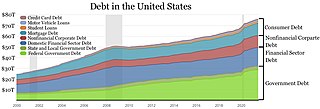
In the United States, student loans are a form of financial aid intended to help students access higher education. In 2018, 70 percent of higher education graduates had used loans to cover some or all of their expenses. With notable exceptions, student loans must be repaid, in contrast to other forms of financial aid such as scholarships, which are not repaid, and grants, which rarely have to be repaid. Student loans may be discharged through bankruptcy, but this is difficult. Research shows that access to student loans increases credit-constrained students' degree completion, later-life earnings, and student loan repayment while having no impact on overall debt.
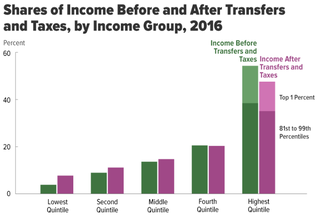
Income inequality has fluctuated considerably in the United States since measurements began around 1915, moving in an arc between peaks in the 1920s and 2000s, with a 30-year period of relatively lower inequality between 1950 and 1980.

Contexts: Understanding People in their Social Worlds is a quarterly peer-reviewed academic journal and an official publication of the American Sociological Association. It is designed to be a more accessible source of sociological ideas and research and has been inspired by the movement towards public sociology.

Kevin Allen Hassett is an American economist who is a former Senior Advisor and Chairman of the Council of Economic Advisers in the Trump administration from 2017 to 2019. He has written several books and coauthored Dow 36,000, published in 1999, which argued that the stock market was about to have a massive swing upward. Shortly thereafter, the dot-com bubble burst, causing a massive decline in stock market prices, though the Dow was soon to recover. It finally did reach 36,000 as the Covid pandemic receded in late 2021.
Entrepreneurship is the creation or extraction of economic value in ways that generally entail beyond the minimal amount of risk, and potentially involving values besides simply economic ones.
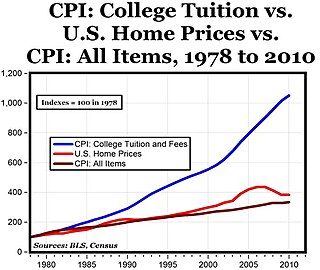
The higher education bubble in the United States is the possibility that excessive investment in higher education could have negative repercussions in the broader economy. Although college tuition payments are rising, the supply of college graduates in many fields of study is exceeding the demand for their skills, which aggravates graduate unemployment and underemployment while increasing the burden of student loan defaults on financial institutions and taxpayers. Moreover, the higher education bubble might be even more serious than load of student debts. Without safeguards in place for funding and loans, the government risks creating a moral hazard in which schools charge students expensive tuition fees without offering them marketable skills in return. The claim has generally been used to justify cuts to public higher education spending, tax cuts, or a shift of government spending towards law enforcement and national security. There is a further concern that having an excess supply of college graduates exacerbates political instability, historically linked to having a bulge in the number of young degree holders.

William A. "Sandy" Darity Jr. is an American economist and social sciences researcher. Darity's research spans economic history, development economics, economic psychology, and the history of economic thought, but most of his research is devoted to group-based inequality, especially with respect to race and ethnicity. His 2005 paper in the Journal of Economics and Finance established Darity as the 'founder of stratification economics.' His varied research interests have also included the trans-Atlantic slave trade, African American reparations and the economics of black reparations, and social and economic policies that affect inequities by race and ethnicity. For the latter, he has been described as "perhaps the country’s leading scholar on the economics of racial inequality."

Roxane Gay is an American writer, professor, editor, and social commentator. Gay is the author of The New York Times best-selling essay collection Bad Feminist (2014), as well as the short story collection Ayiti (2011), the novel An Untamed State (2014), the short story collection Difficult Women (2017), and the memoir Hunger (2017).
For-profit higher education in the United States refers to the commercialization and privatization of American higher education institutions. For-profit colleges have been the most recognizable for-profit institutions, and more recently with online program managers, but commercialization has been a part of US higher education for centuries. Privatization of public institutions has been increasing since at least the 1980s.
Naomi Schaefer Riley is an American conservative commentator and author. Her writings have appeared in the Wall Street Journal, The New York Times, The Boston Globe, The Los Angeles Times, The New York Post, and The Washington Post, among others. At The Wall Street Journal, she covered religion, higher education, and philanthropy for the editorial page. Prior to this assignment, she founded the magazine In Character.
The Journal of Blacks in Higher Education is a former academic journal, now an online magazine, for African Americans working in academia in the United States.

Keeanga-Yamahtta Taylor is an American academic, writer, and activist. She is a professor of African American Studies at Northwestern University. She is the author of From #BlackLivesMatter to Black Liberation (2016). For this book, Taylor received the 2016 Cultural Freedom Award for an Especially Notable Book from the Lannan Foundation.
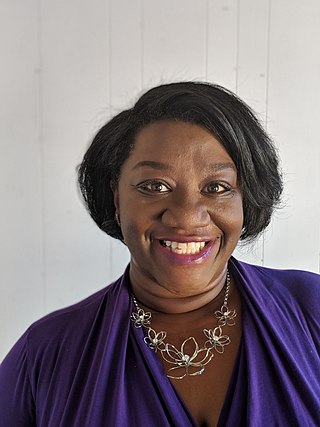
Tressie McMillan Cottom is an American writer, sociologist, and professor. She is an associate professor at the University of North Carolina at Chapel Hill School of Information and Library Science (SILS) and an affiliate of the Center for Information, Technology, and Public Life (CITAP) at UNC-Chapel Hill. She is also an opinion columnist at The New York Times.
Financial issues facing students in the United States include the rising cost of tuition, as well as ancillaries, such as room and board, textbook and coursework costs, personal expenses, and transportation.
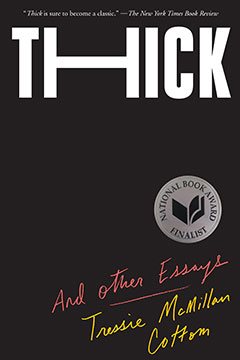
Thick: And Other Essays is a collection of essays by the American sociologist Tressie McMillan Cottom. The book explores a range of topics, including black womanhood, body image, and McMillan Cottom's experience as a Southern black woman academic. Published in 2019 by The New Press, Thick was a finalist for that year's National Book Award.
Kishonna L. Gray is an American communication and gender studies researcher based at the University of Kentucky College of Arts and Sciences. Gray is best known for her research on technology, gaming, race, and gender. As an expert in Women's and Communication Studies, she has written several articles for publications such as the New York Times. In the academic year 2016–2017, she was a Visiting Assistant Professor in the Martin Luther King, Jr. Visiting Professors and Scholars Program at the Massachusetts Institute of Technology, hosted by the Department of Women's and Gender Studies and the MIT Comparative Media Studies/Writing Program. She has also been a faculty visitor at the Berkman Klein Center for Internet & Society at Harvard University and at Microsoft Research.
References
- Bessette, Lee Skallerup (March 20, 2017). "Lower Ed: A (Brief) Review". The Chronicle of Higher Education Blogs: ProfHacker. Retrieved June 21, 2017.
- Goldstein, Dana (March 7, 2017). "The Troubling Appeal of Education at For-Profit Schools". The New York Times . ISSN 0362-4331.
- Gregory, Karen (November 2, 2017). "Lower Ed: The Troubling Rise of For-Profit Colleges in the New Economy". Journal of Cultural Economy. 10 (6): 552–555. doi: 10.1080/17530350.2017.1382384 . hdl: 20.500.11820/73ce26ab-bbaa-4ca8-911a-fe4a920b52a6 . ISSN 1753-0350 – via Taylor & Francis.
- Monteleone, Amanda B. (August 1, 2020). "Book Review: Lower Ed: The Troubling Rise of For-Profit Colleges in the New Economy, by T. McMillan Cottom". Adult Education Quarterly. 70 (3): 309–311. doi: 10.1177/0741713620906818 . ISSN 0741-7136.
- Reed, Matt (February 19, 2017). "Lower Ed: A Review". Inside Higher Ed. Retrieved June 21, 2017.
- "Rev. of Lower Ed by Tressie Mcmillan Cottom". Kirkus Reviews . December 6, 2016.
- Seamster, Louise (2018). "All Credentials Aren't Created Equal". Contexts. 17 (1): 74–75. ISSN 1536-5042. JSTOR 26394265.